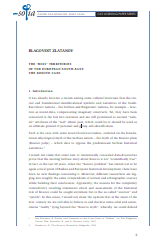From National Leaders to Politicians: The Head-of-State Institution in Southeast European Post-Communist Countries (1989-2004)
From National Leaders to Politicians: The Head-of-State Institution in Southeast European Post-Communist Countries (1989-2004)
Author(s): Aleksander Vezenkov
Subject(s): Governance, Government/Political systems, Politics and society, Sociology of Politics
Published by: Centre for Advanced Study Sofia (CAS)
Summary/Abstract: Any survey on publications in the field of political studies would inevitably show that analysis concentrates rather on leaders, elections and crises than on institutions and inter-institutional relations. This is because institutions are perceived as an already existing framework, as something given. Institutions and relations between them change so rarely and/or so slowly that in many cases these changes could be ignored in a short-term analysis. As it came out from my search for secondary literature especially rare are studies on the head-of-state institution. This article tries to demonstrate that such a study can be a helpful tool for the analysis of the establishment of democratic regimes in former communist countries. It can be revealing in terms of understanding authoritarian, paternalist and populist traditions in post-communist societies and their manifestation on the highest level of the political system in the recent decades. The study focuses on the evolution of the head-of-state institution in the Southeast European post-communist states (Albania, Bulgaria, Romania, the successor states of former Yugoslavia), considering other post-communist countries as controlling cases.
Series: CAS Sofia Working Papers
- Page Count: 26
- Publication Year: 2009
- Language: English
- Content File-PDF

